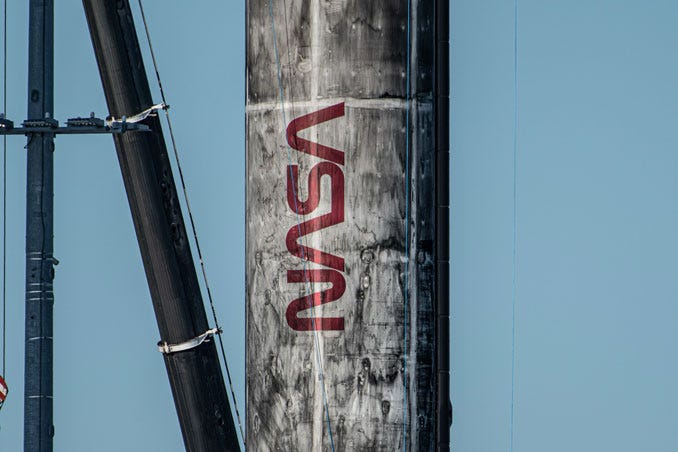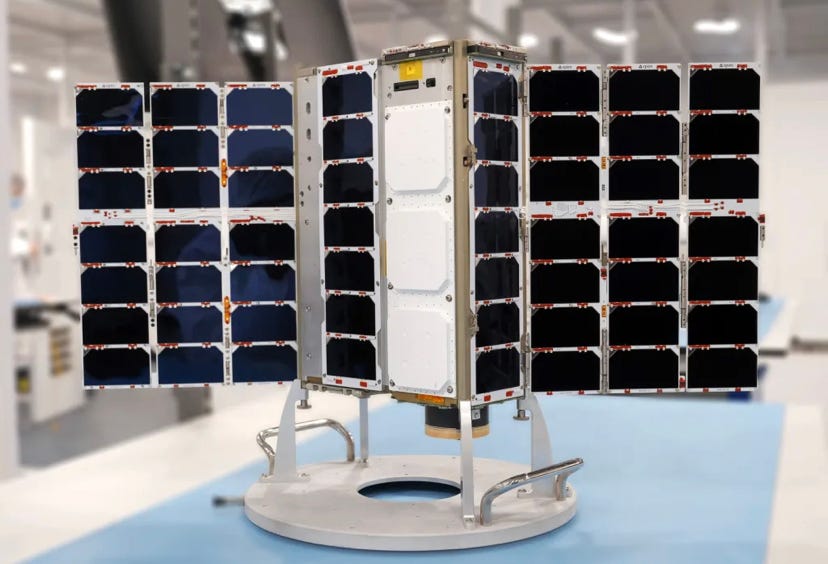Moonshot #8
Booster 1058 makes history, Blue Origin eyes some European real estate, OroraTech and Spire Global get serious about wildfire monitoring, and other commercial space highlights.
Hello Continuum readers and Celestial Citizens,
Welcome back to Moonshot where we will give a bi-weekly rundown of all the private sector space news. If you haven’t already, consider becoming a paid subscriber ($6/month) so you can get past that pesky paywall and read the full Moonshot post!
And here is the commercial space beat…

SpaceX — One week ago today, SpaceX tested its Raptor engines on Starship 25, leading many to believe that the next launch attempt is imminent. Of course, Musk isn’t tight-lipped about his ambitions, claiming recently that Starship would launch in approximately six weeks. That timeline may not be realistic, though. There will be a lot of eyes on this, namely the FAA who will have to officially sign off before the company makes their attempt. That said, the company claims to have made the adjustments necessary for success, such as an earlier ignition in the upper stage engines and a water deluge system for the launchpad. In other company news, the Starlink mega constellation calls into question the sustainability of powerhouse space companies like SpaceX, who had to maneuver Starlink satellites 50,000 times since their initial launch to avoid collisions. And apparently, Starlink satellites might also be leaking radiation and polluting wavelength bands that are typically protected for radio astronomy. Undeterred, SpaceX launched another 22 satellites while you slept — making it a record-setting 16th launch of the same Falcon 9 first-stage booster.
Blue Origin — While already owning an extensive collection of launch facilities — between Texas, Florida, Washington and Alabama — Blue Origin scouts for their next port. It’s not officially announced, but word is that the next acquisition will be somewhere in Europe. CEO Bob Smith assures that the new location is not just about continuing to size up, but it’s more about strategic access, or creating a “road map” for future projects. With hefty objectives between satellite constellations, commercial space flight and NASA partnerships, you could see why they may want to spread out.
OroraTech — Germany-based OroraTech is adding to its wildfire-watching constellation. After all, why staff hundreds of fire towers atop mountain peaks when one constellation of thermal imaging satellites can do the work for us, and at a more comprehensive scale? OroraTech’s FOREST-2 spacecraft (of six cubesats) launched earlier this month can cover 400 kilometers. Even their smaller FOREST-1 spacecraft — launched last year as a demonstration — is actively helping Quebec through Canada’s monstrous wildfires. As of June 28th, U.S. company Spire Global will build and operate eight new satellites for OroraTech’s next venture.
Continuum – At the tail end of June, Continuum Space Systems — not to be confused for the super awesome Continuum newsletter from Celestial Citizen — announced a $3 million seed round which puts their fundraising grand total at over $6 million. Continuum’s service, in their words, “streamlines the mission management process into a single unified system [...] from mission ideation and design to in-space operations.” Their pitch: you just focus on the grandiose mission ideas. We’ll give you a platform — which claims to be industry standard — to handle the logistics.
Benchmark Space Systems — A propulsion developer based in the green mountain state has just raised $33 million in an effort to meet the growing demands of their clients. Ryan McDevitt, CEO of Benchmark Space Systems acknowledges that as their “customers are going out and building new factories and ramping up so that they can go from 10 units a year to 100 units a year, we have to do the same,” says Ryan McDevitt, the company’s CEO.
Danti — Remember life before Google? Yeah, neither do we (sorry Ask Jeeves). Now imagine: a search engine for space data. Brand new startup Danti — who popped up from stealth mode towards the end of June with $2.75 million in pre-seed funding — has imagined just that, and they’re building an AI-driven search engine that will scour all the satellite, drone, and aircraft data for exactly what you need. Sure, companies are more or less on this track already, using AI to cull massive amounts of data, but Danti’s plan has the potential to cut out a lot of time and coding for companies in the future. Even outside the space sector, this technology could be used towards something as domestic as examining the history of a roof on a house. Before you know it, we’ll all be saying “just Danti it.”
Keep reading with a 7-day free trial
Subscribe to Celestial Citizen to keep reading this post and get 7 days of free access to the full post archives.




